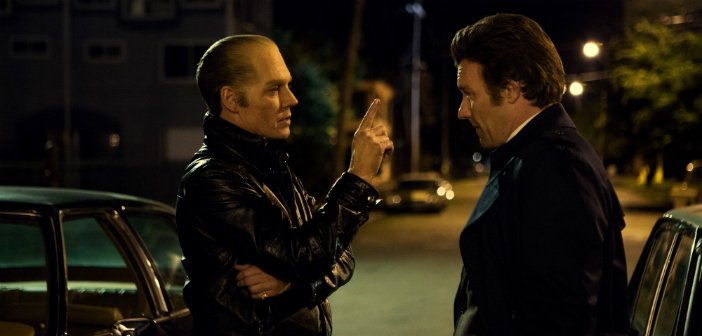After spending the bulk of the past decade portraying an assortment of freaks, weirdos and goofballs – with a few notable exceptions – Johnny Depp is finally getting back to the sort of role that made him such a respected and sought-after performer to begin with, in Scott Cooper’s Black Mass.
As notorious South Boston crime lord James “Whitey” Bulger, Depp’s handsome features disappear completely, replaced by a receding hairline, crooked yellow teeth and a pair of ice-blue contact lenses that make him seem more like a walking corpse than an actual person. It’s unsettling just to look at him, and the amount of menace he exudes with his calm, quiet manner of speaking is enough to make your skin crawl.
Bulger’s rise to power can largely be credited to John Connolly (Joel Edgerton), an FBI agent who grew up in the same neighborhood as Bulger and his younger brother Billy (Benedict Cumberbatch), now a state senator. Connolly wants to bring down the Mafia, and he recruits Bulger as an informant, allowing him and the rest of his Winter Hill Gang to operate virtually unchecked as long as they provide actionable intel on the Angiulo crime family.
Bulger is able to justify the deception as a means to eliminate his competition, allowing him to expand his criminal empire while Connolly and his boss (Kevin Bacon) turn a blind eye to his actions – not to mention leveraging the steady stream of information to elevate their status within the bureau. But the unholy alliance begins to unravel when Bulger’s meteoric rise to the top of the criminal food chain catches the attention of the new Deputy US Attorney (Corey Stoll), who wonders how the one guy who seems to be involved in every illegal enterprise in the city hasn’t been taken down yet.
Black Mass paints a fascinating picture of how people on both sides of the law can be corrupted by power. As Bulger’s shockingly violent outbursts grow more frequent, we also observe Connolly’s increasingly transparent attempts to cover for his old friend’s behavior. Both men are able to justify their actions as contributions toward the greater good, but neither seem to have any idea what that might be. And yet, despite how despicable we might find these characters, the script still manages to humanize them – particularly Bulger, as he imparts a bit of wisdom to his 6-year-old son or loses a few hands of gin rummy to his elderly mother.
It’s the juxtaposition of these scenes with the darker side of Bulger’s personality that make Depp’s performance so noteworthy – and so unnerving. I don’t think I’ve ever been more terrified of a cinematic villain than I was in this film, especially the moment when Bulger leaves the dinner table to chat privately with Connolly’s wife (Julianne Nicholson), a scene which audiences will likely find impossible to get through without their stomachs tying themselves into knots.
But as great as Depp is here – and indeed, this is his best work since his Oscar-nominated turn in Finding Neverland – he’s bolstered by an equally impressive supporting cast. Jesse Plemons and Rory Cochrane shine as two of Bulger’s most trusted enforcers, and Dakota Johnson has a small but pivotal role as the mother of Bulger’s son, but it’s Edgerton that really elevates his game to a whole new level. This is the best we’ve ever seen him, and there’s little doubt that Oscar voters will have his name on their list of contenders.
After a superb debut with Crazy Heart and a solid follow-up effort with Out of the Furnace, director Scott Cooper’s foray into making films as part of the larger Hollywood machine is made all the more watchable by the astounding fact that it’s based on a true story. Black Mass is a fascinating tale of ambition, manipulation and political corruption, and easily one of the best gangster flicks in years.
Johnny Depp gives a menacing, mesmerizing performance as one of the most terrifying onscreen villains in recent memory, a real-life Boston crime lord who leveraged a relationship with the FBI into a massive illegal empire.
-
Score9




